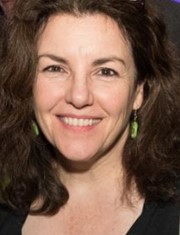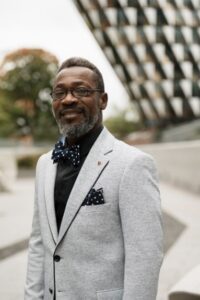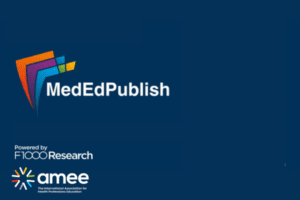AMEE 2024 Programme
Plenaries
1A – Plenary – the Ronald Harden Plenary: Health education, employment and equity: are markets and strategies aligned? - Jim Campbell, WHO
WHO recommends a focus on self-sufficiency for the health workforce, which requires a scale up of production of health workers of 8-12% per year in most countries to meet the Sustainable Development Goals. This requires a focus on both the quality and quantity of health worker education, with consideration of their skills mix, geographical distribution, labour market dynamics and decent employment conditions. In this keynote, Jim Campbell will explore the global trends and best practices with a view to identifying the key strategic priorities and opportunities to strengthen education and respond to employment and population health needs.

Jim Campbell is the Director of the Health Workforce Department at the World Health Organization in Geneva. He oversees the development and implementation of global public goods, evidence and tools to inform investment in the education, employment and retention of the health and care workforce in pursuit of global health security, universal health coverage and the Sustainable Development Goals. His portfolio includes measuring the impact of the COVID-19 pandemic on the health and care workforce, implementation of WHO’s Global Strategy on Human Resources for Health: Workforce 2030, and support to countries within the Working for Health action plan to implement the recommendations of the UN High-Level Commission on Health Employment and Economic Growth.
Jim Campbell coordinates the Global Health Workforce Network engaging member states and all relevant partners in WHO’s work, with special focus on the contributions, rights and roles of women and youth in the health and care sector. He has published extensively, is a member of the Editorial Board of the Human Resources for Health Journal and provides advisory inputs to multi-sectoral programmes on COVID-19 recovery, social spending, education and employment.
3A - Plenary: The climate crisis is a health crisis: implications for health professions education - Liz Grant, University of Edinburgh
COP28 held in December 2023 hosted the first fully dedicated health day providing irrefutable evidence to the global community of climate scientists, policy makers and politicians that the climate crisis is a health crisis. The health day humanised the climate conversations, making explicit what had been hidden beneath global stocktake analysis and Nationally Determined Contributions planning. Beneath all the figures and graphs are people who are suffering because of the way that we have been living. Over 140 nations signed the COP28 Declaration on Climate and Health. While it is non-binding sitting outside the formal UNFCCC decision making as a non-negotiated call to action it does mean that now our health ministries will be inside the ‘climate tent’ negotiating, rather than outside separated from the discussions and decisions which are changing the very nature of health and the infrastructure of health systems. Behind the Declaration on Climate and Health is a movement. Over 40 million health professionals have added their signature to the WHO call for leaders to be far more ambitious for a future that is healthier, fairer, and greener. No other community has such solidarity in the climate space, with solidarity comes strength, but also responsibility.

Liz is an Assistant Principal (Global Health) of the University of Edinburgh, Professor of Global Health and Development and Director of the University’s Global Health Academy. She co-directs two Masters programmes: an MSc in Planetary Health examining the interconnections of the triple planetary crises of climate change, biodiversity loss, and pollution on health and strategies to engage with communities to interpret local knowledge as solutions; and a MSc in Family Medicine with a remit to support family medicine training in lower resourced regions.
Her research spans global and planetary health and healthcare particularly in contexts of poverty and conflict, and she leads work on compassion and the value base of the Sustainable Development Goals. Liz also leads a research group – the Palliative Care in a Changing Climate Unit.
She is a Fellow of the Royal Society of Edinburgh (RSE), and a Fellow of the Royal Society of Arts. She is Deputy Dean International for the Royal College of Physicians in Edinburgh (RCPE) and she sits on the Scottish Government NHS Global Citizenship Board, and on the Steering Group for Health Information for All.
Previously Liz was the Senior Health Advisor to the Scottish Government’s International Development Team. She has worked for the UK’s National Health Service (NHS) in the Public Health Directorate in Lothian. She is an advisor to a number of global health charities, and serves as a trustee for CBM Scotland and a member of the One Health FIELD work for Syrian refugees.
11A - Plenary - Aristotle, medicine, and the search for an accurate definition of social justice in health professions education: An explorative inquiry - Jamiu Busari, Horacio Oduber Hospital, Aruba/Maastricht University, the Netherlands
Who is Aristotle, and what do his teachings have to do with social justice and the (un)hidden prejudices in health profession education (HPE)? In medical training programs, there is the assumption that the curricula offer all students equal opportunities during training. However, marginalized learners, i.e., those who lack the stereotypical qualities (or physical features) defined by the profession, often experience exclusion, implicit prejudices, or unfair treatment during their (clinical) training. In this plenary lecture, we shall use the philosophical teachings of Aristotle to explore (un)hidden prejudices and discrimination in healthcare and HPE. We shall reflect on how (un)acquired privileges influence professional behaviour and the need for more social justice in our HPE programs.

Jamiu Busari is an associate professor of medical education at Maastricht University (NL) and an adjunct professor and scientist at the Institute for Disability and Rehabilitation Research, Faculty of Health Sciences, Ontario Tech University (Canada). He is also a consultant pediatrician at the Horacio Oduber Hospital (Aruba). Jamiu is a Certified Canadian Physician Executive, Harvard Macy Scholar, and an HBS executive education graduate in Managing Health Care Delivery. He is a former executive member of the Netherlands Association for Medical Education (NVMO) and a founding member of ‘sanokondu’ (an international community of practice dedicated to fostering health professional leadership education worldwide).
Jamiu is a public speaker, writer, and clinician educator. As a healthcare leader, he is a fervent advocate for DEI and social justice. He is a member of the University of Maastricht’s advisory council on Diversity and Inclusion and associate editor for ICEnet Blog , Clinical Medicine and Research and Commisioning editor for BMJLeader.
Jamiu’s activities as a clinician and educator have been recognized through various awards, which include the Educational Leadership Award 2015 (World Education Congress), Clinician of the Year Award 2015 (Maastricht University), the International Residency Educator Award 2016 (Royal College of Physicians and Surgeons of Canada). In 2017, he received the Critics’ Choice Award (Association for the Study of Medical Education) and the Jan Heijlman Prize for Best Teaching Specialist in 2022 (Vrije Universiteit, Amsterdam). In 2023, Jamiu was awarded an honorary fellowship by the Royal College of Physicians and Surgeons of Canada.
Jamiu is happily married and has two children, aged 15 and 12.
In Person Outline Programme
- Orientation session
- Opening Plenary
- Networking Reception
- Plenary 2
- Simultaneous Sessions (symposia, Short Communications, ePosters, workshops, point of view, pechakucha™, )
- Networking Session
- Mentoring Session
- Simultaneous Sessions (symposia, Short Communications, ePosters, workshops, point of view, pechakucha™, )
- Networking Session
- Mentoring Session
- Simultaneous Sessions (symposia, Short Communications, ePosters, workshops, research papers, doctoral reports, point of view, pechakucha™, AMEE Fringe)
- Networking Session
- Mentoring Session
- Closing Plenary
Online Outline Programme
- TBC
- AI Symposium
- Orientation session
- Opening Plenary
- Live streaming of selected in-person sessions (plenary, symposia, research papers)
- Online Short Communications
- Online Workshops
- Live streaming of selected in-person sessions (symposia, research papers)
- Online Short Communications
- Online Workshops
- Live streaming of selected in-person sessions (symposia)
- Online Short Communications
- Online Workshops
Live Streamed sessions will be available in Basel, Central European Time. We cannot guarantee that online sessions will be available in all time zones.
Register today or head to our offical AMEE 2024 website for more information on the conference!
AMEE Conference Gateway
We are pleased to announce that after a year of successful operation, we will be once again offering the Conference Gateway on MedEdPublish hosted by F1000, AMEE’s fully Open Access publishing platform. Further information can be found here.

